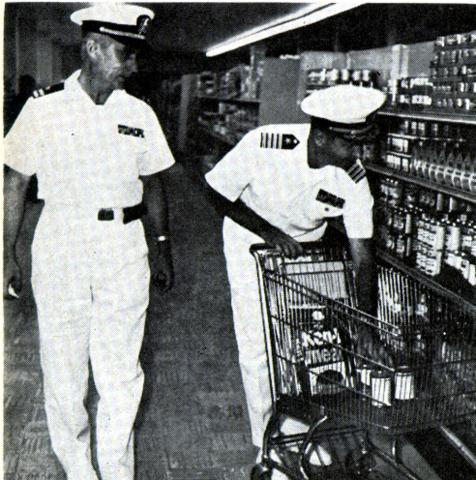Commissaries in a war zone: Origin of U.S. stores in Vietnam date back to 1959

FORT LEE, Va. – In observance of National Vietnam War Veterans Day, March 29, the Defense Commissary Agency reflects on the service and sacrifice of these veterans and their families, and remembers the commissaries that served them.
“We owe a tremendous debt of gratitude to our Vietnam War-era veterans for their service and sacrifice,” said Army Command Sgt. Maj. Tomeka O’Neal, senior enlisted advisor to the DeCA director. “And for those in this group who are also disabled veterans, we welcome them to use their new on-base shopping benefits.”
National Vietnam War Veterans Day recognizes veterans who served in the United States military during the Vietnam War from Nov. 1, 1955 to May 15, 1975. Approximately 9 million Americans served on active duty during the Vietnam War era. Of that number, about 2.7 million served in Vietnam, with more than 58,000 killed and more than 304,000 wounded.
The roots of the observance began in 2012 when President Barack Obama proclaimed March 29 as National Vietnam War Veterans Day, asking all Americans to observe the day with appropriate activities and programs that would commemorate the then 50-year anniversary of the Vietnam War. The date of March 29 was chosen because on that day in 1973 the Military Assistance Command in Vietnam (MACV) was disbanded and the last of the U.S. combat troops left the Republic of Vietnam.
On March 28, 2017, President Donald Trump signed the Vietnam War Veterans Recognition Act of 2017, officially recognizing March 29 as National Vietnam War Veterans Day.
America’s combat presence in Vietnam began with the first wave of U.S. combat troops, 3,500 U.S. Marines, who came ashore at Da Nang, South Vietnam in the spring of 1965. Up until then, a number of American military advisors – some with their dependents – had been stationed in Vietnam for nearly a decade. They had replaced the French military who had unsuccessfully attempted to regain control of their Indochina colony after WW II.
The first American military commissary opened in Saigon in 1959 and was operated by the U.S. Navy. Several branch commissaries later opened in Cholon, Newport, Long Binh and near Tan Son Nhut Air Base. These commissaries served American service personnel and their families as well as U.S. news reporters, contract workers and government workers stationed in Vietnam. The commissary patronage changed after the Gulf of Tonkin incident in August 1964. The expansion of hostilities caused all U.S. dependents to be immediately evacuated from Vietnam.
At first, the Saigon Commissary could not accommodate the thousands of incoming combat troops scattered all over Vietnam. So those troops were given mess hall privileges and pay rations to enable them to shop on the local economy.
As the war expanded so did the availability of products in commissaries. In 1965 a U.S. dairy company opened operations in Saigon and started shipping dairy products to the commissaries all over Vietnam. The company received whole milk solids from the States, which were then reconstituted with purified water and packaged in cartons for distribution. Some former service men recalled that the chocolate milk was outstanding.
The U.S. Army took over the responsibility for running the commissaries in Vietnam in April 1966. The commissaries remained in operation even after the 1973 cease fire because many of the U.S. personnel were still there in non-combat missions. On April 30, 1975, communist forces overran Saigon and U.S. contractors and Vietnamese support personnel fled for the airports in a panic, desperately trying to evacuate. The commissaries were looted by locals who stole as much food as they could carry in the wake of the South Vietnamese surrender.
-DeCA-
PHOTO CAPTION: U.S. Naval officers shop in the Saigon Commissary in 1964. (Photo courtesy of Military Market Magazine). To see photos related to this story go to DeCA’s Flickr page.
About DeCA: The Defense Commissary Agency operates a worldwide chain of commissaries providing groceries to military personnel, retirees and their families in a safe and secure shopping environment. Commissaries provide a military benefit, saving authorized patrons thousands of dollars annually on their purchases compared to similar products at commercial retailers. The discounted prices include a 5-percent surcharge, which covers the costs of building new commissaries and modernizing existing ones. A core military family support element, and a valued part of military pay and benefits, commissaries contribute to family readiness, enhance the quality of life for America’s military and their families, and help recruit and retain the best and brightest men and women to serve their country.
